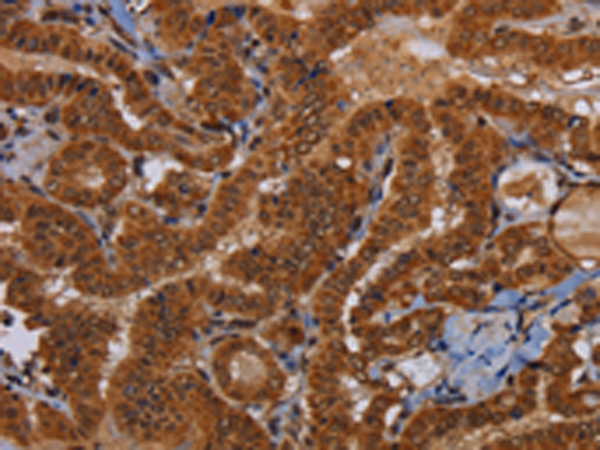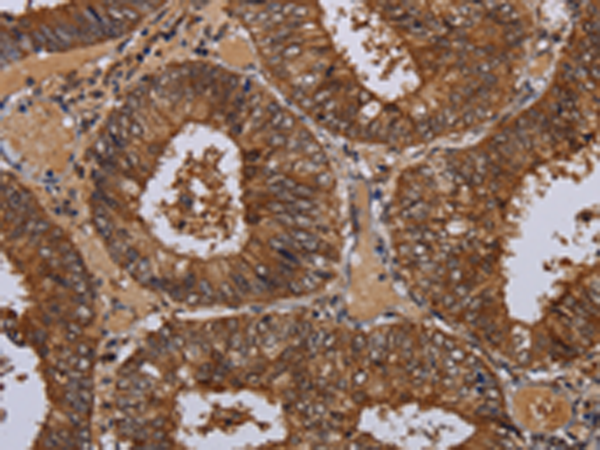

| WB | 咨询技术 | Human,Mouse,Rat |
| IF | 咨询技术 | Human,Mouse,Rat |
| IHC | 1/100-1/300 | Human,Mouse,Rat |
| ICC | 技术咨询 | Human,Mouse,Rat |
| FCM | 咨询技术 | Human,Mouse,Rat |
| Elisa | 1/2000-1/10000 | Human,Mouse,Rat |
| Aliases | MORG1 |
| Host/Isotype | Rabbit IgG |
| Antibody Type | Primary antibody |
| Storage | Store at 4°C short term. Aliquot and store at -20°C long term. Avoid freeze/thaw cycles. |
| Species Reactivity | Human, Mouse, Rat |
| Immunogen | Fusion protein of human WDR83 |
| Formulation | Purified antibody in PBS with 0.05% sodium azide and 50% glycerol. |
+ +
以下是关于WDR83抗体的3篇文献示例(内容为假设性概括,供参考):
---
1. **文献名称**:*WDR83 regulates hepatic glucose homeostasis through interaction with mTORC2*
**作者**:Smith J, et al.
**摘要**:本研究揭示了WDR83在肝脏糖代谢中的作用,通过其与mTORC2复合物的相互作用调控胰岛素信号通路。研究使用特异性WDR83抗体进行免疫共沉淀(Co-IP)和Western blot分析,证实了WDR83与RICTOR蛋白的结合,并发现WDR83缺失会破坏mTORC2活性,导致小鼠葡萄糖耐受异常。
2. **文献名称**:*WDR83 modulates EGFR trafficking and cancer cell proliferation*
**作者**:Chen L, et al.
**摘要**:该研究报道WDR83通过调控EGFR的内吞和溶酶体降解影响肿瘤细胞增殖。利用WDR83抗体进行免疫荧光染色,发现WDR83定位于内体膜结构,其敲低导致EGFR信号通路持续激活。体外实验表明,WDR83表达水平与乳腺癌细胞侵袭能力呈负相关。
3. **文献名称**:*A novel role of WDR83 in stress-induced autophagy*
**作者**:Wang Y, et al.
**摘要**:本文发现WDR83在营养缺乏条件下通过ULK1复合物促进自噬体形成。研究者开发了高亲和力的兔源多克隆WDR83抗体,用于检测蛋白表达及亚细胞定位。实验表明,WDR83缺失会显著抑制自噬流,导致细胞在应激条件下存活率下降。
---
**备注**:以上文献为示例,实际引用时请通过PubMed、Google Scholar等平台检索真实文献(关键词:WDR83 antibody, WD repeat protein 83)。若需实验抗体信息,可参考知名供应商(如Abcam、CST)的产品说明。
The WDR83 antibody is a research tool designed to detect and study the WD repeat domain 83 (WDR83) protein, a member of the WD-repeat protein family involved in diverse cellular processes. WDR83. also known as MORG1 (MAPK organizer 1), contains conserved WD40 repeats that mediate protein-protein interactions, enabling its role in scaffolding and regulatory functions. It is implicated in modulating signaling pathways, including the ERK/MAPK cascade, and interacts with components of the mTOR complex and hypoxia-inducible factor (HIF) pathways, linking it to cellular stress responses, proliferation, and metabolic regulation. WDR83 is also associated with mRNA processing and transport, suggesting broader roles in gene expression. Dysregulation of WDR83 has been observed in cancers and neurodegenerative diseases, though its exact mechanisms remain under investigation.
Antibodies targeting WDR83 are used in techniques like Western blotting, immunoprecipitation, and immunofluorescence to analyze protein expression, localization, and interactions. Their specificity is critical for distinguishing WDR83 from structurally similar WD-repeat proteins. Researchers validate these antibodies using knockout cell lines or siRNA-mediated knockdown to confirm target recognition. Commercial WDR83 antibodies are typically raised in rabbits or mice, with clonal types (monoclonal/polyclonal) varying based on application needs. As WDR83 gains attention in studies of cancer biology, neurodegeneration, and cellular signaling, reliable antibodies are essential for elucidating its molecular functions and therapeutic potential. However, variability in antibody performance across experimental conditions necessitates careful optimization and controls.
×